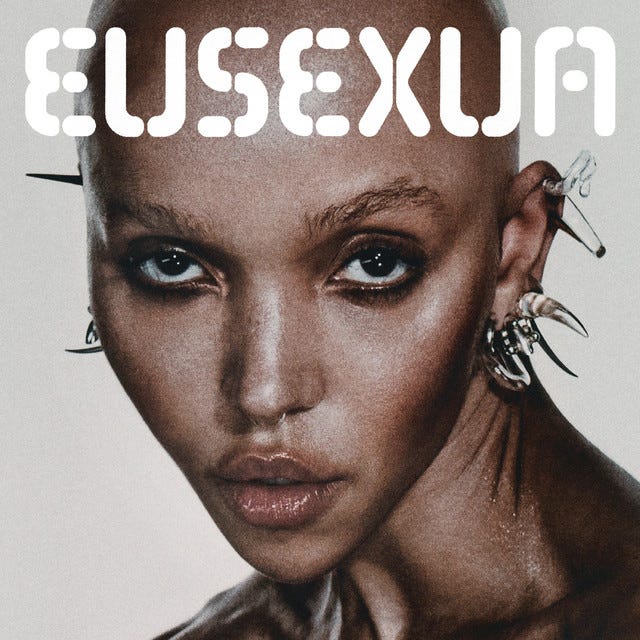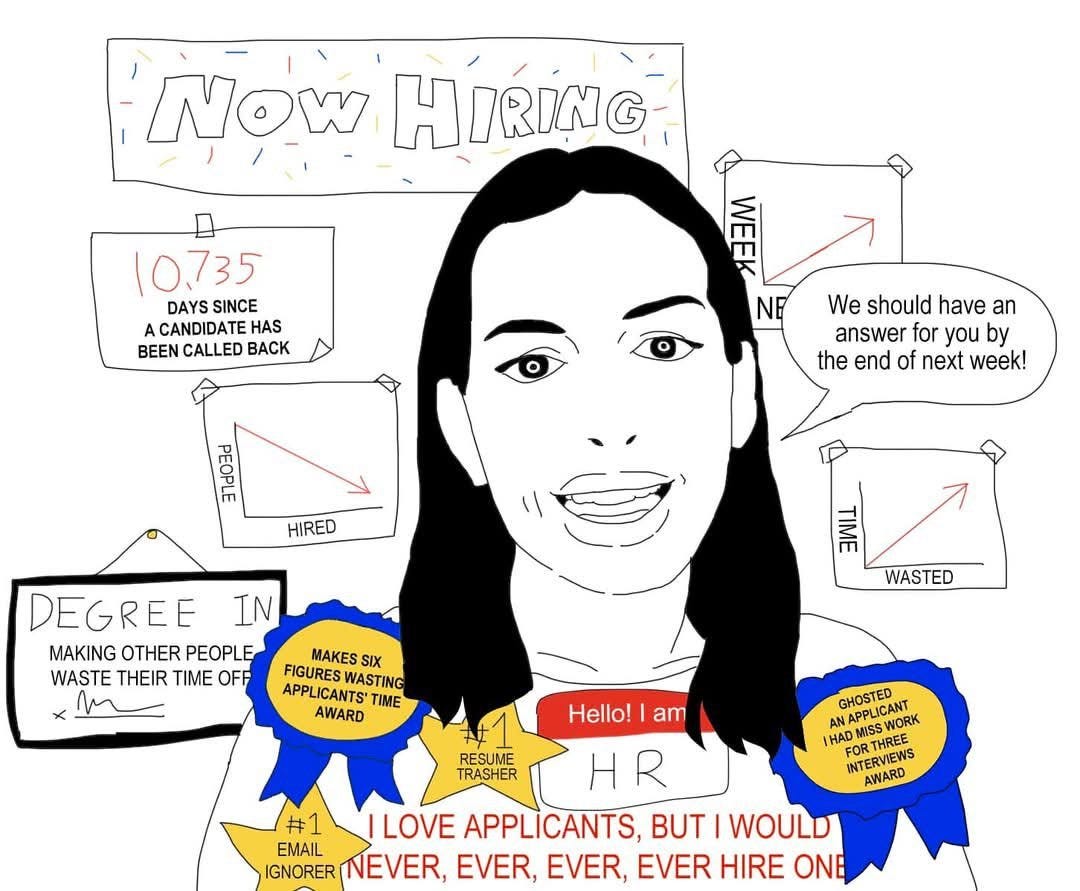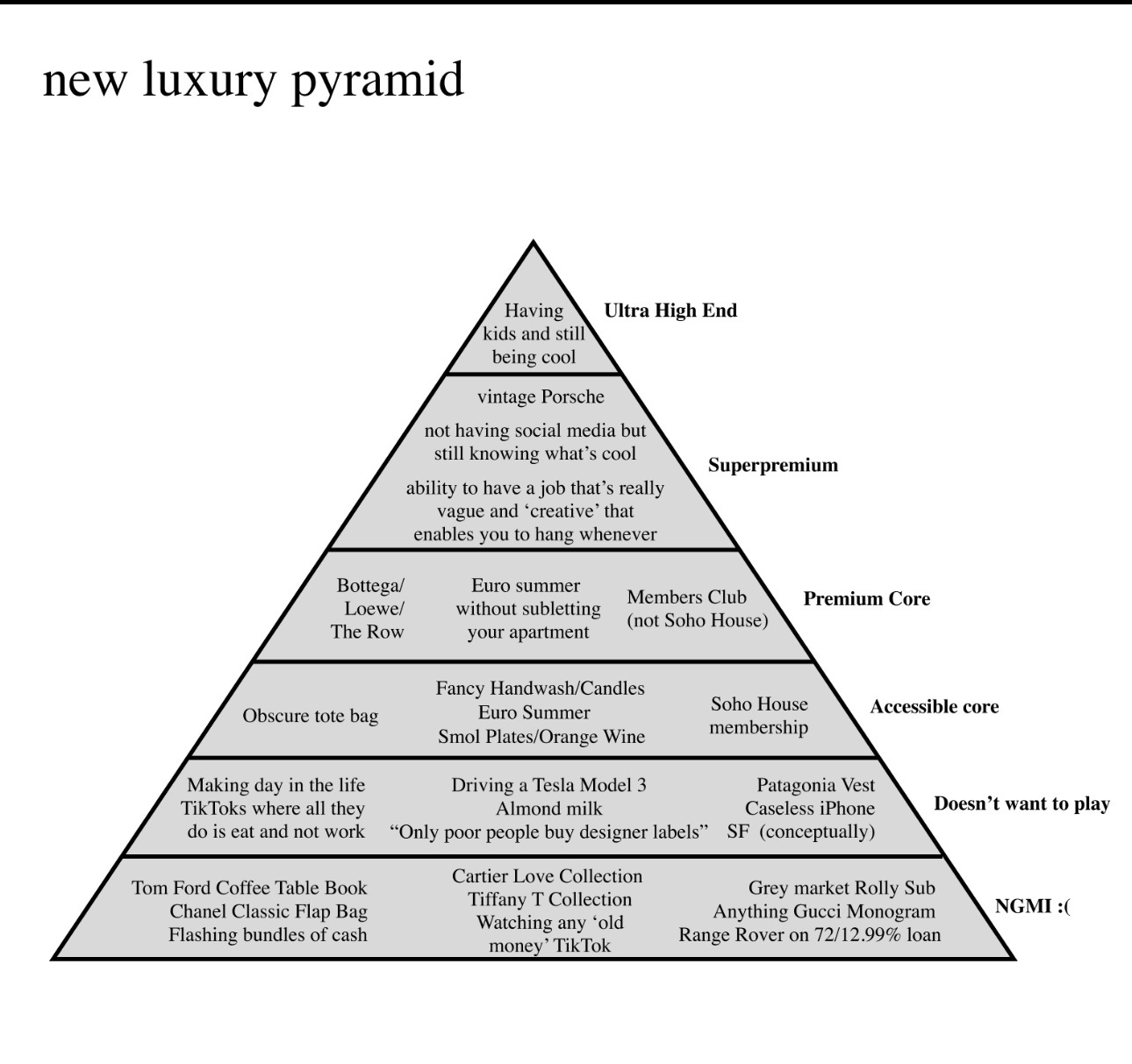Through winter, a shadowy notion clung to my consciousness that our collective mood was shifting. Not only was the political landscape going through a paradigm shift, but something in the DNA of culture-at-large was also slowly - but surely - unravelling. Everywhere, it seemed like villains and celebrities were running amok and rubbing shoulders, unashamedly flaunting glitzy wealth and chasing visceral pleasures in the intimate shadows of Zero Bond, Casa Cipriani and Berghain. Gotham city aura all around. A vibrational frequency that somehow felt hedonistic, but despairing. Feral and wild, yet also emotionally detached.
I struggled to put my finger on this vague intuition until I saw a post on LinkedIn from Edmond Lau, when it all suddenly clicked. In a post, titled “The Dark Mode Shift”, Lau argues that we’re moving away from “light mode” - an era defined by a “cultural push to project positivity”, where the world “wore a clean, hopeful facade”. A moment in time defined by “pizza parties and mental health seminars trying (and failing) to hold together a crumbling social contract”. But today, as resentment rises to a breaking point and the optimistic veneer begins to crack, Lau believes we’re moving into a new, more individualistic, 'mask-off' era, where the vibe has shifted. “You’re either a supervillain ruthlessly chasing the bag, a nihilist reveling in debauchery, or ngmi.”
‘Light Mode’ was embodied by sanitised, discrete markers of taste - wearing Le Labo Santal 33, living in a bright, airy apartment loft, with NTS playing in the background, subtly showcasing an Aesop Resurrection Aromatique pump bottle in your bathroom. ‘Dark Mode’ on the other hand, abandons these symbols of virtue in favour of vice. Here, the darker undercurrents of pleasure and greed are embraced with full force: indulgent luxury goods, opulent power dressing and a return to the boom boom aesthetics of the yuppie era.
This edition of idle gaze features a conversation with Lau; the designer, art director, and “luxury memeologist” who coined the ‘Dark Mode’ shift. We discuss our joint reflections on the abandonment of performative virtue - the rejection of smiling assassins and faux artisan ‘if you know you know’ taste, and the embrace of nihilistic vice. How will this resurgence of opulent exclusivity, supervillain behaviour and cool detachment from positivity shape our collective aspirations, behaviours and desires?
Alexi: What were the initial signals that made you think something significant was happening culturally?
Edmond: It's very hard not to tie this back to politics, because it is such a big event with such an impact across many different levels. Over time, as the political and economic rifts in the US and the anglosphere grew - we started seeing inflation get worse and worse - It just seemed like there was an overall feeling of bleakness that had really set in.
Another aspect I was thinking about was the return of conservatism in areas like music. I was thinking about FKA Twigs a lot, and Mk.gee. Just the tone of the music that was coming out, which on a purely production level was very stylistically raw sounding.
Alexi: FKA Twigs’ Eusexua is an interesting example. On the press tour she’s been speaking at length about her inspiration for the album. She spent a lot of time in Prague when they were filming The Crow. She started going to warehouse raves in the city - these really dark, intense places, filled with ominous energy. But this was where people went to fight their demons and ultimately found a sense of self-fulfilment. This, to me, is a perfect representation of the emotional tension that defines this vibe shift: you have to embrace the darkness to reconnect with your inner self. Rejecting virtue and embracing vice might at first feel evil, but ultimately, it’s about getting closer to our carnal desires.
Edmond: When FKA Twigs describes what Eusexua means, it’s essentially the height of human experience. It's like when a comedian or songwriter has that moment just before an epiphany, where it all kind of clicks together, and your mind goes kind of like: Aha. That kind of mental release of Eusexua across the human condition, that resonates with what I'm trying to capture with ‘Dark Mode’. It’s about embracing the most visceral, pure moments of experience.
I always go back to the Anne Hathaway HR Zoom meeting meme as the counter, I think it’s such an embodiment of ‘Light Mode’. For me, it’s the smiling assassin, doing something evil under the veneer of virtuousness. It’s the perfect encapsulation of all the failed promises of that time. It was very two-faced and performative, which, on some level, is more ominous than just showing your true face from the get-go, right?
Alexi: Another significant consequence of shedding this virtuous mask is how we behave online. This expectation to radiate positivity has been fuelled by a need to carefully curate our public social media feeds with smiley, well-lit photos and meticulously edited captions communicating our do-good values. But in the ‘Dark Mode’ shift, there’s a retreat to more private spaces, posting - without fear or judgement - to close friend lists and in Whatsapp group chats. This is also something we’re seeing happening in the offline realm, with the resurgence of members' clubs and photo bans in nightclubs.
Edmond: It’s also happening in the world of luxury. I was talking to Harry Salmons at edition+partners about the resurgence of closed door VIP events and chess nights hosted by jewellery brands, all hidden away from cameras. And it made me think of this idea that we’re returning to exclusivity. Before, it was FOMO - you could have attended. But now it's: you’re not invited: it's not for you, luxury is for an exclusive elite that you are not part of, unless you pay an exorbitant amount of money, in which case maybe we’ll let you in.
Alexi: It’s the return of elite ‘safe’ spaces where people can pursue their vices away from the public eye.
Edmond: Yeah, I think it’s also this yearning for the third places we’ve lost. Private spaces that provide not just somewhere for people to come together, but where you are also encouraged to be debaucherous.
Alexi: You’ve previously compared and contrasted Mercedes-Benz’s "Grow Up" campaign with the Hyundai Grandeur as two examples that epitomise ‘Light Mode’ versus ‘Dark Mode’. The former disguises luxury through the language of moral self-actualisation. The latter is the ultimate “Neo-Yuppie" symbol that represents a return to formality, unabashed greed, and privacy through blacked-out windows. What other examples have you seen that embrace ‘Dark Mode’?
Edmond: Haider Ackermann's Tom Ford Debut for AW25 was a start-to-finish collection showing someone being very glamorous and at the same time looking down to party. There was one look with a dressing gown, where you could imagine someone throwing it on the morning after the party and lighting a cigarette. Luxury cars in general are just getting more and more imposing. Just look at the grill of the new 7 series - it’s gargantuan. And in hospitality, you have places like Chez Fifi in New York, or the Aman, where you see all these gilded age details at the front.
Alexi: It’s certainly a far cry from the notions of discrete, ‘quiet’ luxury that have dominated the zeitgeist over the past decade. As you’ve pointed out in another classic Edmond Lau meme - the new luxury pyramid - obscure tote bags, ‘smol plate’ orange wine dinners - traditional markers of esoteric and high-brow consumption and behaviour - are starting to lose their cultural capital. Why is that?
Edmond: Because this ‘if you know you know’ knowledge is increasingly seen as a pretence. Having your own internet radio show, having the level of abundance to pursue your passion, while being unemployed, while your parents pay your rent, used to be a status symbol. But pretending to be poor doesn’t have clout anymore. For the past 10 years, it wasn’t cool to be wealthy in that really brash way, and in some ways it is now.
Alexi: You’ve mentioned in previous conversations that the unapologetic bagchasing and limitless material greed of ‘Dark Mode’ is ultimately an act of self-destruction. It made me think of Mark Fisher’s concept of “depressive hedonia”1 - the paradoxical state where individuals constantly pursue surface-level pleasure and stimulation yet remain fundamentally unsatisfied and depressed. At the same time, there is a sense of salvation in the darkness. Once we can shed all the performative lightness that didn't serve us, only then can we discover our real identities and purpose. What comes next? Where do we go from here?
Edmond: I think that people will eventually start to snap out of it. This is a moment of catharsis we're in. Only after people have unveiled their true selves can they find some actual common ground. I don't think anybody fundamentally hates on a purely evil level. Those who decided to chase the bag in ‘Dark Mode’, once they realise they haven't gotten what they wanted - that might be the tipping point.
You can follow
on X and LinkedIn.Footnotes:
I recently had the chance to sit down with long-time editorial collaborator
to discuss everything from my chaotic research process, the role of trends in brand-building, a recent obsession with cyberpunk novels and favourite Berlin routines:I explored the idea of ‘depressive hedonia’ in more detail in idle gaze 053.









So interesting, indeed, loved the conversation format too, and thanks a lot for a shout out <3
So interesting. I think connected to the Dark Mode phenomenon, we’re seeing such a resurgence of gothic/dark aesthetics in culture, which I think says a lot about where the world is at. Wrote a few thoughts here https://open.substack.com/pub/whyyoushouldcare/p/a-gothic-mayhem?r=laov1&utm_medium=ios